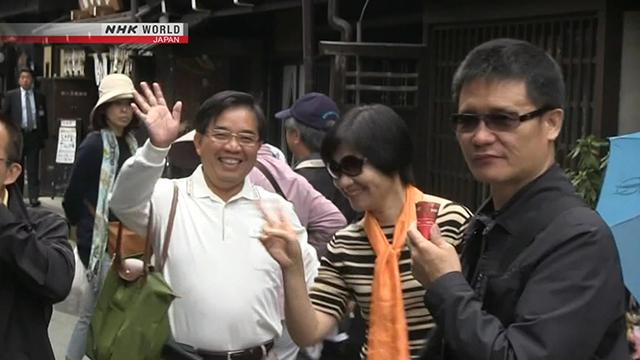The Japan Tourism Agency says foreign visitors spent US$36 billion last year. That's up nearly 18% -- almost in line with the growth in visitor numbers.
Chinese tourists spent over US$15 billion, or about 40% of all inbound receipts. Taiwanese tourists dropped around US$5 billion, and South Korean visitors weren't far behind.
While the big picture looks rosy, average spending per tourist has declined over the past 2 years. The 2017 figure was around US$1,400 -- half the average tourist budget in the United States.
The Japanese government aims to nearly double annual tourism revenue by 2020. The Tourism Agency says that as fewer tourists are going on shopping sprees, it will try to steer them toward regional destinations to lengthen their stays.
Catering to visitors who want to enjoy nightlife
More and more businesses in Japan are eyeing visitors from abroad who want to enjoy the country's nightlife.
A Tokyo-based firm operates nighttime tours for those who are interested in visiting pubs and other establishments.
One such tour involves bar-hopping in Ebisu, downtown Tokyo and covers a restaurant serving yakitori, or grilled chicken skewers, and an izakaya, or Japanese-style pub.
The Japanese guide explained to 6 American participants how to eat edamame, or green soybeans, and drink distilled liquor mixed with fruit juice and club soda.
One of the participants said the grilled chicken and the drink were delicious, and the guide's detailed explanations also made the tour enjoyable.
Megumi Sakuma, who works for the tour operator, says visitors from other countries tend to hesitate to enter pubs in back alleys. She says her firm will introduce more services targeting them.
Another spot that's popular among those seeking to enjoy Tokyo's nightlife is a cafe in the fashion district, Harajuku, featuring the latest Japanese pop culture. A cake-shaped merry-go-round and colorful mushroom ornaments decorate its interior. Food menus also come in various colors. Many visitors from abroad can be seen taking photos with their smartphones. A couple from Australia said they enjoyed the cafe's unique atmosphere and cute dishes.
The cafe is open until 10:30 PM. It says about 40% of its customers last year were foreigners. A staff member says she hopes the visitors enjoy its distinctive concept and ambience.
Japan's government also wants to boost nighttime tourism
Japan's government also plans to respond to calls from foreign visitors for a better nightlife. It will take measures to revitalize the nighttime economy.
It has set a target of raising the number of visitors to 40 million and the amount of their annual spending in the country to 8 trillion yen, or about US$72 billion, by 2020 -- when Tokyo hosts the Summer Olympics and Paralympics. That's double the amount they spent in 2017.
If their spending reaches the government target, the figure will surpass sales posted by all department stores across the country in 2016.
The Japan Tourism Agency says allowing foreigners to experience what's only possible in Japan is the key to encouraging them to spend more. Agency officials say it is particularly important to meet demand for more nighttime activities.
Starting in April 2018, the agency plans to take steps including holding events at night.
A group of lawmakers from the main governing Liberal Democratic Party has submitted a set of recommendations, including longer opening hours at theaters and museums, as well as later train and bus services.
Tourism agency head plans to work with the private sector
Tourism agency head Akihiko Tamura says entertainment accounts for only about 3% of spending by foreign visitors in Japan, whereas that figure reaches 10% in some other countries.
He says these visitors are voicing discontent over the limited number of sound nighttime entertainment and activities for adults in Tokyo.
He says his agency will work with the private sector to turn things around, as tackling the issue through the government alone is difficult.
